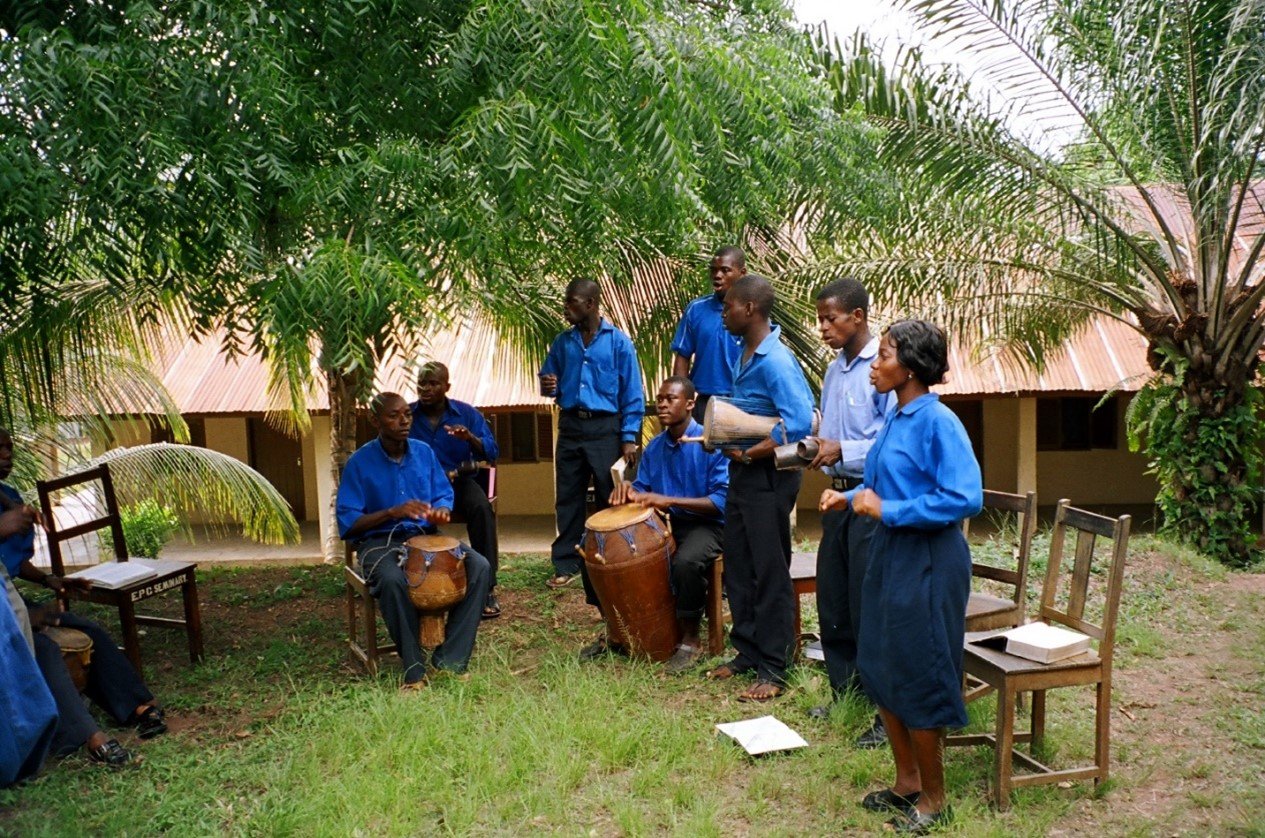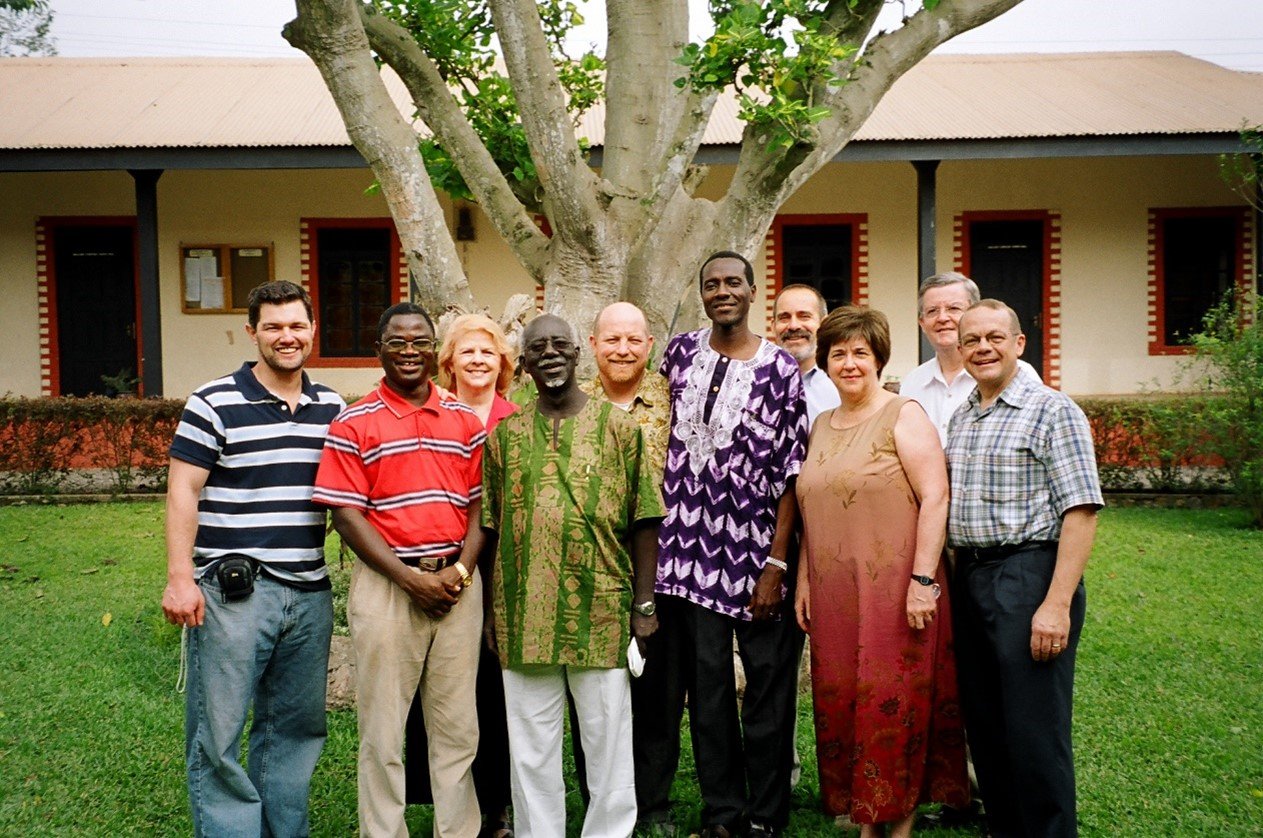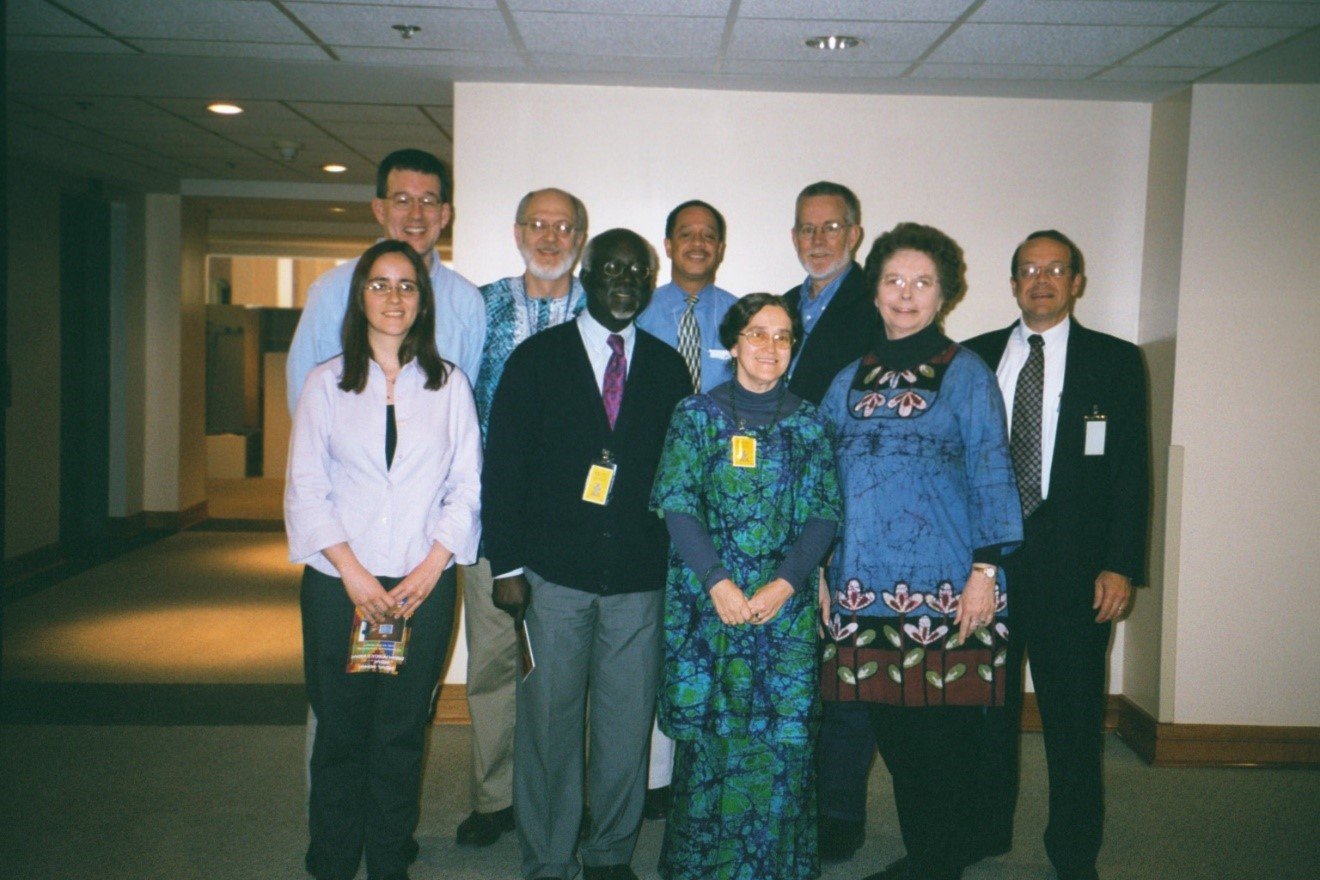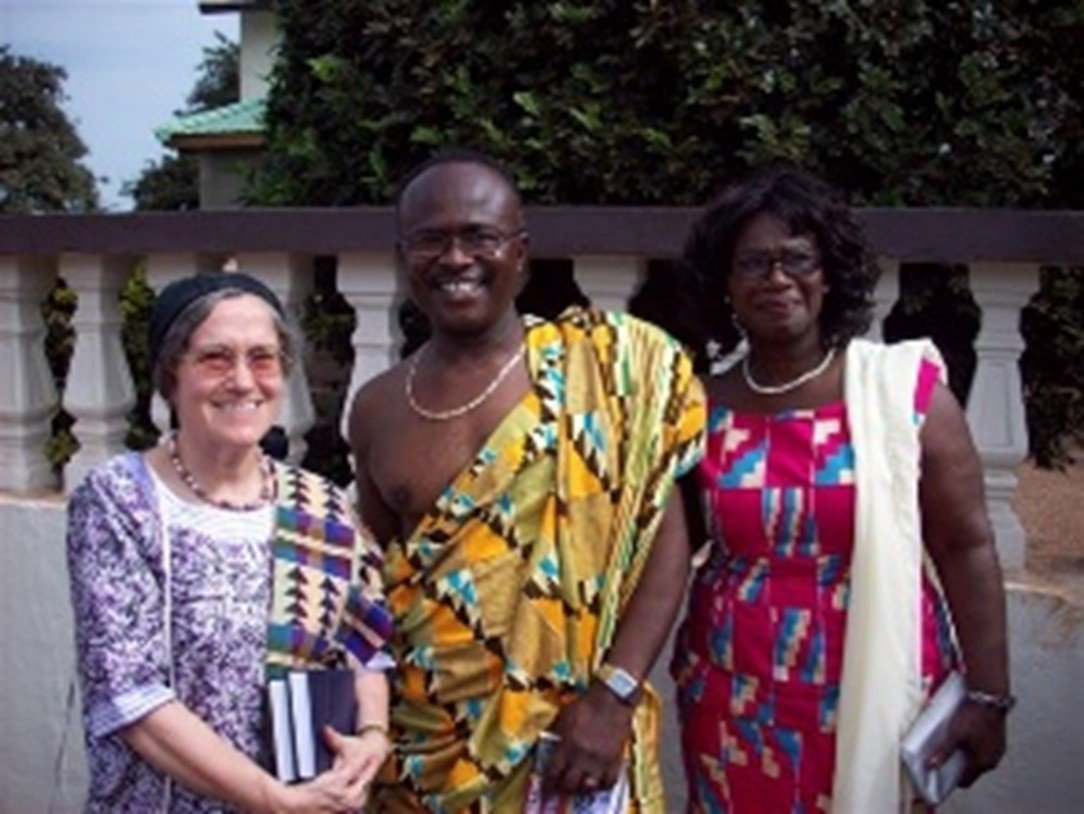History of The Outreach Foundation in Ghana: Learning at the Feet of African Christians
Chapter 4
Kwame Bediako and the Akrofi-Christaller Institute for Theology, Mission, and Culture: Learning at the Feet of African Christians
Dwenini Mmen: “The Strength of the Ram Depends Not So Much on Its Horns, But on Its Heart”
Africa as a resource for mission and theology
We have seen in the preceding two chapters that by the middle of the 1990s, African Christians had inspired American Presbyterians to a renewed engagement in mission and evangelism at home and abroad. Over the next ten years, another side of the Christian movement in Africa would begin to impact Presbyterians in America: theology. More American Christians began reading works by African Christians that offered fresh understandings of the Good News of Jesus Christ for faith and practice. The impact was like seeing new facets of a diamond, the “gospel diamond.”
On one of his early trips to Ghana during his time as Coordinator of PECGA in West Africa, Bill Warlick became acquainted with the Rev. Dr. Kwame Bediako, founder of the Akrofi-Christaller Memorial Center for Research and Applied Theology (later to become the Akrofi-Christaller Institute for Theology, Mission, and Culture). He was greatly impressed with Bediako as a theologian and missiologist. Several Presbyterian mission co-workers were reading Bediako’s works. One of them, the Rev. Gar Kelley, studied for a Th.M. at Akrofi-Christaller Institute during his service in Ghana.
I was still on the staff of Presbyterian World Mission when I read my first article by Kwame Bediako, “Theological Reflections.” It was part of a compendium of the addresses given at a conference in 1995 whose theme was “Serving with the Poor in Africa.” [1] Reading it inspired me to write to this emerging missiologist.
Kwame Bediako and the Akrofi-Christaller Institute for Theology, Mission, and Culture
On my last trip to Africa while on the staff of Presbyterian World Mission (1997), I visited the Akrofi-Christaller Institute and learned that it was embarking on an ambitious building phase. As I left World Mission to join The Outreach Foundation in 1998, I passed that information to my successor in the Office of International Evangelism, the Rev. Bill Young. Young had been a mission co-worker in Ghana and had read Bediako while he was doing graduate study at Fuller Seminary. He was very enthusiastic in his support for Akrofi, as was Mr. Doug Welch, the PCUSA Coordinator for Africa. Over the next several years, those two offices of Presbyterian World Mission would send more than $200,000 to Akrofi-Christaller Institute for the construction of new faculty housing.
Through the close relationship that The Outreach Foundation maintained with Presbyterian World Mission, I learned that Kwame Bediako and his wife, Dr. Gillian Mary Bediako (also a professor at Akrofi-Christaller Institute), would be visiting the PCUSA General Assembly in 2001. I drove from Tennessee, where The Outreach Foundation was located, to Louisville to meet them. When I told them I hoped to learn more about mission and mission thought in Africa, the Bediakos suggested that I subscribe to the Institute’s Journal of African Christian Thought. Through its articles, I began to see mission and theology through the eyes of African Christians, and I longed for more people to get to know this amazing resource for mission and theology that God had planted in Ghana.
The seeds of the 2006 Trip to Ghana
The seed of a stronger link between The Outreach Foundation and the Akrofi-Christaller Institute germinated in 2005 when The Outreach Foundation and Presbyterian Frontier Fellowship co-sponsored a global mission conference, “From Everywhere to Everyone: The New Global Mission.” The conference highlighted the fact that the center of gravity of Christianity had moved from North America and Europe to the “Global South.” Our plenary speakers included Kwame Bediako, and many of the workshop leaders were from the non-Western world. [2] Dr. Bediako’s speech had a profound impact on many of us who attended the 2005 conference. I decided that the next step for The Outreach Foundation in Ghana would be to take a group to the Akrofi-Christaller Institute and spend several days with Dr. Bediako.
Several young scholars had joined the Institute, including Solomon Sule-Saa and John Azumah. Solomon Sule-Saa was serving as the Institute’s chaplain while working on his Ph.D. John Azumah had earned a doctorate in Islamic Studies in the United Kingdom and had recently returned to Ghana from a three-year teaching assignment in India. In addition to teaching on Islam at Akrofi-Christaller Institute, Professor Azumah was setting up a separate Centre for Interfaith Research and Resources.
The primary focus of the trip would be to learn from African missiologists and theologians at Akrofi, but the trip also would be an opportunity to renew the relationship of The Outreach Foundation with the Presbyterian Church of Ghana and the Evangelical Presbyterian Church, Ghana. Our hope was to re-engage with the mission projects described in chapters 2 and 3 of this history. [3] We also looked forward to meeting the new PCUSA Regional Liaison for West Africa, the Rev. Glen Hallead. [4]
Engaging with the Presbyterian Church of Ghana and the Evangelical Presbyterian Church, Ghana
Five people joined me on this trip to Ghana in March 2006. Solomon Sule-Saa and John Azumah were our hosts and took care of all the logistical details. The trip started with a warm welcome at the airport by Solomon who offered prayers of thanksgiving and petitions for our time together. Glen Hallead was also present as the official PCUSA liaison, and we were glad to meet him.
The next day John Azumah joined us for a tour of Trinity Theological Seminary, where Presbyterians, Methodists, and other Protestants are trained for ministry. Over lunch, we had our first spirited discussion of a subject that we would continue throughout the trip, “doing theology in the mother tongue.” Professor Kwame Bediako and the Akrofi-Christaller Institute had as one of their main emphases the need for people to do biblical studies and theological reflection in their native language. It was not a subject that American Christians normally talked about. For Ghanaians, however, with ethnic and people groups who speak more than seventy languages, and for whom the national language, English, is not necessarily their first language, this is a vital topic. Can I study God’s Word in my heart language, or do I have to think about God in English? The professors at Trinity who joined us during lunch were delighted to field our questions and share their perceptions.
We were off to a good start, which we were to call a “reverse mission experience.” We had come to learn from Ghanaians about theology and mission, and we were already being introduced to new facets of what it means to follow Jesus faithfully in one’s context.
Our next stop was the Presbyterian Church of Ghana headquarters where we were warmly welcomed by the Principal Clerk (Stated Clerk) of the PCG, the Rev. Herbert Opong. He briefed us on the state of the church and its mission challenges. The highest priority for the church, he said, was leadership training, especially for lay leaders working in rural areas. He also referred to a need for adequately trained lay leaders who could serve fellowships of Ghanaians living in the United States. The Outreach Foundation was already at work among Portuguese-speaking immigrants in the United States (see chapter 3), and the Rev. Opong’s comments about ministry among the Ghana Diaspora in the U.S. made me wonder if we could connect with this group as well.
The following day we worshiped at Kaneshie Presbyterian Church whose pastor was the Rev. Dr. Isaac Fokuo, previously mentioned in Chapter 2. [5] After his service as Director of the Ecumenical and Social Relations Office of the General Assembly of the Presbyterian Church of Ghana, Dr. Fokuo became a Mission Partner in the Africa Office of the Worldwide Ministry Division of the PCUSA during the PCUSA’s “Year with Africa” (1994–1995). The Rev. Dr. Dianne Shields, one of our trip participants, had become acquainted with the Rev. Fokuo, and she hoped her congregation in Illinois could establish a sister church relationship with the Kaneshie church.
Over 1000 worshipers were at church that day. The service lasted five hours, including communion and three periods of lengthy prayer—one for confession, another for thanksgiving, and the final one for intercession. For those who had not been to Ghana before, not only was the service long, but it was also their introduction to “dancing the offering,” one of the liturgical features of Ghanaian Christian worship in which congregants bring their offerings forward in a rhythmical, dancing style.
Afterward, over lunch with Isaac and Cecelia Fokuo, we learned about some of the missions in which Kaneshie Church was involved. They were enthusiastic supporters of the Northern Outreach Program mentioned in Chapter 3, and they were planning two major mission projects as part of their Jubilee celebration: a new church in a non-churched region and a dormitory for a new church-related college in Akropong, near the Akrofi-Christaller Institute.
Our journey of discovery in Ghana continued the next day as we visited the “slave castle” at Elmina, on the southern coast of Ghana. This was one of the places where slaves were housed before embarking for the Americas. It was sobering and depressing to come face to face with the heritage of the trans-Atlantic slave trade. Soloman Sule-Saa accompanied us this day. He told us that it was not only Europeans who engaged in the slave trade; certain African tribes had also participated in this evil by capturing people from other tribes and selling them to the Europeans. Later on, John Azumah added a further detail than most of us had not known about: There was also an Arab slave trade that sent Africans eastward to the Arabian Peninsula and beyond. I made a note from the experience of this day that all future trips to Ghana should include a day at the Elmina Slave Castle.
The next two days were spent with the Evangelical Presbyterian Church which is located primarily in the Volta Region of eastern Ghana where Ewe is the predominant language. John Azumah and Glen Hallead accompanied us as we got to know the leadership of this denomination. Smaller than the Presbyterian Church of Ghana, the EPC,G had an impressive range of programs: evangelism, development, women’s work, and a new ministry of deliverance from evil spirits led by the men’s organization. We also visited the EPC,G seminary in Peki and were fascinated to learn that its curriculum included drumming and dancing. Our group was impressed with the leadership of the EPC,G, and its seminary. For me, it was a chance to renew the original commitment of The Outreach Foundation to support the evangelistic work of both the Presbyterian Church of Ghana and the Evangelical Presbyterian Church, Ghana.
One final observation of our time with the leadership of each of the Presbyterian communions in Ghana: Both denominations continued a strong commitment to the global church through their participation in the meeting of the World Council of Churches, held in Brazil earlier in 2006, and through their joint hosting of a meeting of the World Alliance of Reformed Churches (now World Communion of Reformed Churches) in Accra two years earlier. The ecumenical commitment that caught the attention of American Presbyterians in 1957–58 [6] was still present in our Ghanaian partners.
The heart of the trip: the Akrofi-Christaller Institute
We were now oriented to the ministry and mission of the two Presbyterian denominations in Ghana, and we were eager to experience the Akrofi-Christaller Institute and its rector, the Rev. Dr.Kwame Bediako. It proved to be an unforgettable, transformative two days.
Akrofi-Christaller is a community of spiritual, theological, and missional formation. We first experienced the community at worship. Hymns were sung in English and Twi, one of the major languages of southern Ghana. Multi-lingual worship was the norm at Akrofi as part of the Institute’s commitment to the use of the mother tongue for worship and theology.
Following the morning devotions, we had the first of several sessions with Dr. Bediako, who told us of the history of the Institute. It was named for two early linguists, Johannes Gottlieb Christaller, a European missionary, and Clement Anderson Akrofi, a Ghanaian Christian. They worked together to translate the Bible into the Twi language and compiled a Twi dictionary. It is upon this legacy of honoring the mother tongue of one of the significant people groups of southern Ghana that the Institute builds its commitment to “mother tongue theology.”
From other staff, we learned that the Akrofi-Christaller Institute offers several degree programs and serves the Presbyterian Church of Ghana in several ways: providing continuing education for PCG graduates of Trinity Theological College who are “probationers” for a couple of years before they are permitted to be ordained; offering continuing education for pastors, catechists, and evangelists in the northern part of Ghana, which at the time was a “mission field” of the church without an organized presbytery; and holding mission conferences for pastors of the PCG.
Our discussion of the use of the mother tongue for theology, worship, and mission continued in the afternoon with John Azumah, Solomon Sule-Saa, and two other Akrofi staff, Dr. Philip Laryea and the Rev. Ernestina Afriyie who, like Solomon, was working on her Ph.D. Dr. Laryea’s doctoral work had been on Omo, an Evangelical Presbyterian Church catechist and musician who lived in Peki, where the EPC,G seminary was located. Omo was a great example of what might be called “mother tongue musicology,” as he expressed his Christian faith through hymns and songs in the Ewe language. The Rev. Afriyie had a different mission context for her ministry, that of youth who speak only English. She questioned the heavy emphasis of Akrofi on doing theology in an African “mother tongue” in light of the emerging mission field of young people in the cities of Africa, young people who have left their parents’ language behind and belong to a new culture, the urban youth culture of Africa. If they are to be reached, she said, it will be in English.
Charles Wiley, the theologian in our group, asked our hosts a question that would become our subject when we next spoke with Dr. Bediako: “What is the justification for this emphasis on the “mother tongue?” Is it simply an evangelistic strategy to reach people with the gospel, or is there a theological rationale for pursuing theology in one’s mother tongue? For example, are there theological and biblical insights to be gleaned from texts written in the Twi language, or any other native language in Africa, that would not be available simply from English texts?
That night after supper in the home of Solomon and Beatrice Sule-Saa, Dr. Bediako answered Charles Wiley’s question. He showed in several passages of scripture how the Twi version yields insights for the gospel in the Akan culture that would not have been available simply from the English texts. His conclusion: “We do ‘mother-tongue theology’ for our own theological formation.”
The next morning, I was asked to lead the morning devotions, and I attempted to put Dr. Bediako’s insights from the night before in my talk on Ephesians 3:7–12 and 4:14–16. Using the lens of “mother-tongue theology,” I shared that Paul was telling us that the church must be planted in each culture to reveal the “wisdom of God in its rich variety” (3:10) for the spiritual formation of us all (4:15–16). My testimony that morning was that by coming to Ghana, and specifically to Akrofi-Christaller Institute, we had been privileged to see some “new facets of the gospel.”
In addition to our interaction with faculty and staff, we spent time with some students on campus. Two were from Ghana, and the rest were from other parts of Africa and North America. All saw Akrofi as a place where they could wrestle with church-and-mission issues they were facing in their home countries.
We concluded our time in Akrofi with a time of fellowship and prayer at the home of Kwame and Gillian Bediako. On this evening we were blessed to experience the Bediakos as more than missiologists. First and foremost, they were fellow disciples of Jesus. It was a holy time.
Experiencing the Northern Outreach Program of the Presbyterian Church of Ghana
During our remaining time in Ghana, we worshiped with two congregations of “Northern Peoples.” We saw first-hand the unique drumming and dancing style of two different people groups. Our hosts kindly translated the words of the songs that the worshipers were singing and thus enabled us to understand that these new believers from non-Christian backgrounds had internalized the faith in their mother tongues.
Through our visit to Ghana, we saw a demonstration of commitment by the Presbyterians of Ghana to engage in intentional new church developments among people of cultures different from the majority of the members of the Presbyterian Church of Ghana. The people in these new congregations were able to use their heart language as they lived out their faith in worship, theology, and mission. At Akrofi-Christaller Institute we saw the missiological justification for this mission strategy and discovered a deeper reason for Christians to live out their faith in their heart language: Each culture has insights into the Gospel that are worth sharing with the wider Church. In short, our time in Ghana underscored the importance of the Akrofi-Christaller Institute for Theology, Mission, and Culture, not only as a resource for African Christianity but for the Global Church. I returned to the U.S. with plans to bring new teams to Ghana and experience Christianity through African eyes at Akrofi-Christaller Institute.
Sadly, Kwame Bediako died from liver cancer in June 2008, but he left a powerful legacy upon which the Akrofi-Christaller Institute has built over the years. [7] It has added new study centers that further enhance its importance as a resource for the global church: Primal and Christian Spirituality, Early African Christianity, Interfaith Studies and Engagement with Africa, and Gospel and Culture Engagement.
Mr. Don Brown, a Trustee of The Outreach Foundation, shared this testimony after his first mission trip with The Outreach Foundation:
The trip to Ghana was a radically different experience for me, much as my year in Vietnam. It truly changed the course of my life and deepened my faith significantly. Our evening in the Bediako home was one of the high points of my life. Another was looking out my window early one morning of our visit and watching Dr. Bediako so wonderfully working with the street children, showing them about picking up trash and caring for God's creation. Every moment of being with him was rewarding.
Akrofi-Christaller Institute for Theology, Mission, and Culture continues to be a place for spiritual and theological transformation. My hope is that more people from around the world will journey to West Africa and “come and see what God has done.” (Psalm 66:5)
———
[1] “Theological Reflections,” in Serving with the Poor in Africa, Tetsunao Yamamori, et al, eds.(Monrovia, Liberia: MARC, 1996), pp. 181–192.
[2] Another of those speakers, Mr. Ramez Atallah, of the Bible Society in Egypt, was mentioned in chapter 7 of my “History of The Outreach Foundation in Egypt: 1998–2020,” available in digital format from the author, jeff.ritchie49@gmail.com.
[3] Both denominations were part of the Project for Evangelism and Church Growth in Africa (Chapter 2), and the PCG had inspired us through its Northern Outreach Program (Chapter 3).
[4] In the late 1990s, the PCUSA decentralized its mission by appointing mission co-workers for the various regions of the world where it had mission relationships. The Rev. Gar Kelley, mentioned earlier, was the first of these “Regional Liaisons” for West Africa. He was succeeded by Ms. Caryl Weinberg. Glen Hallead was her successor and arrived in Ghana just before our visit.
[5] The photo of Isaac and Cecelia Fokuo in Chapter 2 was taken in 2006 during our visit to the Kaneshie congregation.
[6] See Chapter 1
[7] A documentary on the life of Dr. Bediako, produced by Dr. James Ault, is available online from Akrofi-Christaller Institute: https://aci.edu.gh/. Two books on the legacy of Kwame Bediako for mission and theology are Seeing New Facets of the Diamond, previously cited in footnote 1, a testimony to Kwame Bediako’s legacy, and a newly-published work by Dr. Tim Hartman, Kwame Bediako: African Theology for World Christianity.





